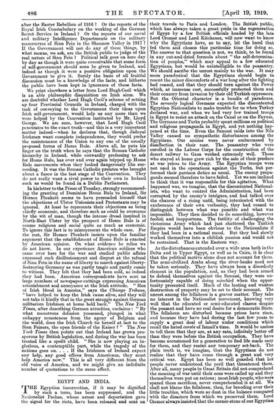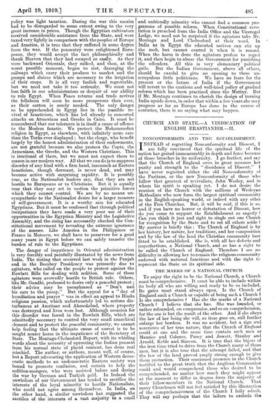EGYPT AND INDIA.
r rim Egyptian insurrection, if it may be dignified 1 by such a term, has been suppressed, and the Nationalist Pashas, whose arrest and deportation gave the signal for the riots, have been released and sent on their travels to Paris and London. The. British public, which has always. taken a great. pride in. the regeneration of Egypt by a few British officials headed by the late Lord Cromer and Lord. Kitchener, will now want to know why the Egyptians have, so to say; bit the hand that fed them. and chosen this particular, time for doing so. The answer to that question is not, we think, to be found in any cut-and-dried formula about " the self-determina- tion of peoples,"' which may appeal to a few educated Egyptians, but would be unintelligible to the peasantry. We should ascribe the unrest- mainly to the war. It may seem paradoxical that the Egyptians should begin to resent the minor discomforts of a war long after the fighting had ceased, and that they should turn against the Power which, at immense cost, successfully protected them and their country from invasion by their oldlauldsh oppressors. But the Oriental character is . a bundle- of paradoxes. The severely logical Germans expected the discontented Egyptian Nationalists to make trouble for us when Turkey declared war, and when we had very few trained troops in Egypt to resist an attack on the or on the Fayum. The Germans and Turks probably spent 'millions on political and religious propaganda in Egypt, and yet nothing•hap- pened at the time. Even the Senussi raids into the Nile Valley caused no sympathetic disturbances among the Egyptians. Our armies were never embarrassed by disaffection in their rear. The. peasantry who were enrolled in the Labour. Corps for the construction of the desert railway to Gaza worked extremely well Those who stayed at home grew rich by the sale of their produce at war prices to the Army. The Egyptian troops were not used in the operations against, the Turks, but per- formed their garrison duties as usuaL The enemy propa- ganda seemed therefore to have failed. Yet we are inclined to think that it was responsible for this agitation. What happened was, we imagine, that the discontented National- ists, who want to control the Administration, had been corrupted by the enemy's intrigues, and had talked over the chances of a rising until, being intoxicated. with the exuberance of their own verbosity, they had ceased to distinguish between what was possible and what was impossible. They then decided to do something, however foolish and inopportune. The 4-utility of challenging the victorious Army which had just shattered the Turkish Empire would have been obvious to the Nationalists if they had been in a rational mood. But they had slowly worked themselves into a childish passion and would not be restrained. That is the Eastern way.
As the disturbances extended over a wide area both in the Delta and in- Upper Egypt, as well as in Cairo, it is clear that the political motive alone does not account for them. The semi-civilized Arabs along, the river-banks need not be taken seriously. They have always been a disorderly element in the population, and, as they had been armed to defend themselves against the Senussi, they were un- fortunately capable of doing mischief when the oppor- tunity presented itself. Mach of the looting and wanton destruction of property may be set to their account. The unrest among the fellaheen is a graver matter. They take no interest in the Nationalist movement, knowing very well that the educated or semi-educated classes despise the peasant and have no real desire for a democratic State. The. fellaheen are disturbed because prices have risen, and because they have had during the last few years to supply a great deal of labour under. conditions which recall the hated core4e of lamail'e time. It would be useless to tell them that they are, at any rate, infinitely better off than they were before the British oceupafion. They have become accustomed for a generation to find life made easy for them, and they resent. any temporary set-back. The plain truth is, we imagine, that the Egyptians do not realize that they have come through a great and very critical war. Egypt has been so well guarded that her people never understood the peril that threatened them. After all, many people in Great Britain did not comprehend the meaning of war until their sons were called up and they themselves were put on rations; mostlrish people, who were spared these sacrifices, never comprehended it at all. We shall not blame the fellaheen, then, for brooding over their little troubles, which were as dust in the balance compared with the disasters from which we preserved them. Lord Cromer always insisted, that the corner-stone of our Egyptian policy was light taxation. During the war this maxim had to be disregarded to some extent owing to the very great increase in prices. Though the Egyptian cultivators received considerable assistance from the State, and were taxed very lightly in comparison with the peoples of Europe and America, it is true that they suffered in some degree from the war. If the peasantry were enlightened Euro- peans, they would accept the fact philosophically and thank Heaven that they had escaped so easily. As they were backward Orientals, they sulked, and then, at the worst possible moment, began to riot, damaging the railways which carry their produce to market and the pumps and sluices which are necessary to the irrigation of their crops. It is all very foolish and regrettable, but we need not take it too seriously. We must not lose faith in our administrators or despair of our ability to rule Egypt. When Peace returns and trade revives the fellaheen will soon be more prosperous than ever, as their cotton is sorely needed. The only danger to be apprehended in Egy* lies in the possible re- vival of fanaticism, which has led already to concerted attacks on Armenians and Greeks in Cairo. It must be remembered that our tolerance is in itself a cause of offence to the Moslem fanatic. Wo protect the Mohammedan religion in Egypt, as elsewhere, with infinitely more care than the Turks ever displayed ; but the clergy, who benefit largely by the honest administration of their endowments, are not grateful because we also protect the Copts, the Armenians, the Greeks, and the Western Christians. This is irrational of them, but we must not expect them to reason in our modern way. All that we can do is to suppress disorder of any kind with a firm hand, inasmuch ad Eastern fanaticism, though dormant, is never dead, and may become active with surprising rapidity. It is possibly true, as the Nationalist leaders say, that they are not hostile to Europeans or to Christians. But it is equally true that they may set in motion the primitive forces which they cannot control. We are by no means un- sympathetic to the Nationalist desire for a larger measure of self-government. It is a worthy aim for educated Egyptians. But it must be confessed that through political inexperience they have made a very poor use of their opportunities in the Egyptian Ministry and the Legislative Assembly, and the rising has necessarily checked the Con- stitutional movement by revealing the extreme ignorance of the masses. Like America in the Philippines or France in Morocco, we shall have to persevere for a good many years in Egypt before we can safely transfer the burden of rule to the Egyptians.
The danger of impatience in Oriental administration is very forcibly and painfully illustrated by the news from India. The rioting that occurred last week in the Punjab and in the Bombay Presidency was primarily due to agitators, who called on the people to protest against the Rowlett Bills for dealing with sedition. Some of these agitators were avowedly hostile to British rule. Others, Like Mr. Gandhi, professed to desire only a peaceful protest ; their advice may be paraphrased as " Don't nail his ears to the pump." But the appeal for a " day of humiliation and prayer " was in effect an appeal to Hindu religious passion, which unfortunately led to serious dis- turbances at Amritsar and Ahmedabad, where property was destroyed and lives were lost. Although occasion for this disorder was found in the Rowlett Bills, which are admittedly necessary to control the very small anarchical element and to protect the peaceful community, we cannot help feeling that the ultimate cause of unrest is to be sought nearer home in the impatience of the Secretary of State. The Montagu-Chelmsford Report, with its whirling words about the necessity of uprooting the Indian peasant from his normal state of placid content, has done real mischief. The author, or authors, meant well, of course, but a Report advocating the application of Western demo- cratic methods to an undemocratic Eastern society was bound to promote confusion, and certain to help the sedition-mongers, who were assisted before and during the war by German and Turkish gold. In Ireland the unwisdom of our Government has tended to sacrifice the interests of the loyal minority to hostile Nationalists, who could not agree among themselves. In India, on the other hand, a similar unwisdom has suggested the sacrifice of the interests of a vast majority to a small and unfriendly minority who cannot find a common pro- gramme of possible reform. When Constitutional revo- lution is preached from the India Office and the Viceregal Lodge, we need not be surprised if the agitators take Mr. Montagu and Lord Chelmsford at their word. In India as in Egypt the educated natives can stir up the mob, but cannot control it when it is roused. When the harm is done the agitators profess to regret it, and then begin to abuse the Government for punishing the offenders. All this is very elementary political guile. But the Indian Government, above all others, should be careful to give no opening to these un- scrupulous little politicians. Wo have no fears for the present or the future of India if the Government will revert to the cautious and well-tried policy of gradual reform which has been practised since the Mutiny. But if Mr. Montagu continues to cherish the design of turning India upside down, in order that within a few years she may progress as far as Europe has done in the course of centuries, there is no saying what may happen.



































 Previous page
Previous page